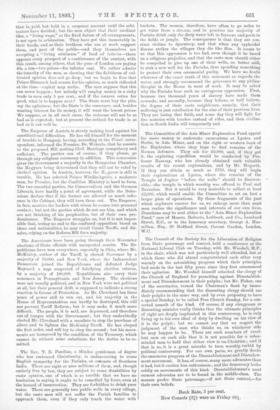The Rev. T. B. Pandian, a Hindoo gentleman of degree
who has embraced Christianity, is endeavouring to rouse English sympathy for the Pariahs, or outtcasts of Southern India. There are eight or nine millions of them, and, though entirely free by law, they are subject to some disabilities by caste opinion, one of which is so terrible that we have no hesitation in saying it ought to be remedied by force, even at the hazard of insurrection. They are forbidden to drink pure water. There are generally two public wells in every village, but the caste men will not suffer the Pariah families to approach them, even if they only touch the water with buckets. The women, therefore, have often to go miles to get water from a stream, and in practice the majority of Pariahs drink only the dirty water left in furrows and pools in the fields or jungle. The consequence is that they are con- stant victims to dysentery, and that when any typhoidal disease strikes the villages they die like flies. It seems to us that this oppression is too bad, even though it be based on a religious prejudice, and that the caste men should either be compelled to give up one of their wells, or, better still, to sink a new well for the Pariahs, thus spending something to protect their own ceremonial purity. We have no doubt whatever of the exact truth of this statement as regards the water, and strongly recommend the grievance to any philan- thropist in the House in want of work. It may be asked why the Pariahs bear such an outrageous oppression. First, because two thousand years of slavery have made them cowards ; and secondly, because they believe, or half believe, the dogma of their caste neighbours, namely, that their suffering is just retribution for the sins of their previous lives. They are losing that faith, and some day they will fight for five minutes with torches instead of rifles, and then civilisa- tion in. South India will temporarily end.






































 Previous page
Previous page